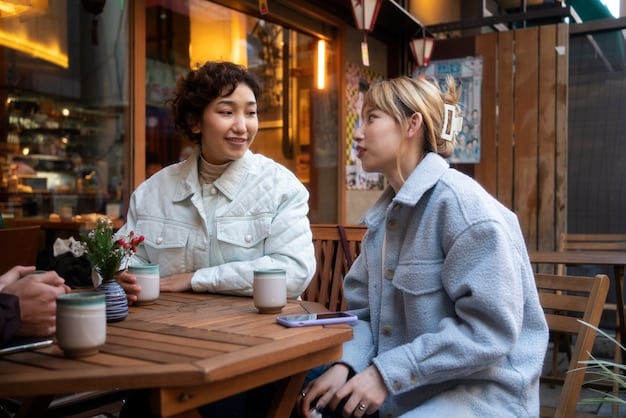Korean Drama Vocabulary: 20 Essential Phrases to Learn

Enhance your Korean drama viewing experience by learning 20 essential phrases commonly used in K-dramas, offering deeper cultural understanding and emotional connection to the stories.
Want to understand your favorite Korean dramas even better? The key lies in learning some essential vocabulary. This guide breaks down 20 must-know phrases to enhance your viewing experience and connect with the stories on a deeper level. Start your journey into the heart of K-dramas today with this Korean Drama Vocabulary: Learn 20 Essential Phrases to Enhance Your Viewing Experience!
Why Learn Korean Drama Vocabulary?
Korean dramas, or K-dramas, have captured hearts worldwide. Beyond the captivating storylines and charismatic actors, a significant part of their appeal lies in the language and cultural nuances. Learning some essential Korean phrases can dramatically improve your viewing experience.
Understanding common expressions unlocks a richer understanding of the characters’ emotions, motivations, and the cultural context of the story. It moves you beyond simple translation and into a more immersive experience.

Deeper Cultural Understanding
Many Korean phrases carry cultural weight that’s difficult to convey through subtitles alone. For instance, honorifics and levels of formality deeply impact how characters interact. By learning these nuances, you gain a more profound cultural understanding.
Enhanced Emotional Connection
Certain phrases express emotions more vividly in Korean than in English. By grasping the original intent, you can connect more deeply with the characters and their emotional journeys.
- Knowing common expressions like “Aigoo” (아이구) can help you appreciate the characters frustrations or exasperation
- Recognizing polite speech forms shows respect that is essential in Korean culture.
- Understanding words for family relationships enhances the understanding of complex family dynamics in the drama.
Learning Korean drama vocabulary elevates your viewing from passive observation to active engagement. It’s a rewarding way to appreciate the art and culture embedded within these shows.
In conclusion, understanding Korean phrases enriches viewing experience and offers cultural insight, deepening connections with characters and storylines. Dive in to get more from every scene!
Essential Greetings and Polite Phrases
When diving into any language, mastering basic greetings and polite phrases is crucial. In Korean dramas, these expressions are constantly used and reflect the importance of respect and social harmony.
Knowing these phrases allows you to immediately grasp the tone of a conversation and understand the relationship dynamics between characters. Let’s explore some fundamental expressions.
Greetings
These are the most common ways to initiate a conversation:
- Annyeonghaseyo (안녕하세요): Hello (formal)
- Annyeong (안녕): Hi (informal)
Expressions of Gratitude
Expressing thanks is essential in Korean culture, and these phrases are frequently heard in dramas.
- Gamsahamnida (감사합니다): Thank you (formal)
- Gomawo (고마워): Thanks (informal)
Mastering these greetings and expressions allows for a good foundation in understanding conversations in Korean dramas. It enhances the overall watching experience when these expressions resonate.
To summarise, mastering greetings and gratitude expressions significantly improves understanding of Korean dramas, by grasping the essence of communication and respect depicted on screen.
Common Phrases of Agreement and Disagreement
Following greetings, understanding how characters agree or disagree is essential. These phrases reveal much about a character’s stance and their relationship to others in the scene.
Recognizing these terms helps you anticipate the direction of the conversation and gain a deeper understanding of the unfolding drama.
Agreement
These terms are often used to show that you’re on the same page:
- Ne (네): Yes (formal)
- Eung (응): Yeah (informal)
- Maja (맞아): That’s right
Disagreement
When characters differ, these phrases come into play:
- Aniyo (아니요): No (formal)
- Ani (아니): No (informal)
- Shirheo (싫어): I don’t want to

Understanding consent and rejection not only adds another dimension, but also informs how characters interact with each other throughout the drama. It is important to watch the expression on the person speaking as well as tone.
In sum, understanding terms of agreement and disagreement improves the emotional intelligence of viewer and clarifies the dynamics between characters. Watch nuances and understand them more deeply!
Emotional Expressions
Korean dramas are renowned for their emotional depth, and a core element of this is found in the language itself. Many phrases capture feelings in a way that mere subtitles cannot fully express.
Learning common emotional phrases allows you to resonate with the characters on a deeper level, intensifying your emotional connection to the story.
Happiness and Joy
Celebrating positive moments requires these expressions:
- Joa (좋아): I like it / I’m good
- Gippeuda (기쁘다): I’m happy
Sadness and Distress
When characters face hardships, these phrases are often heard:
- Seulpeuda (슬프다): I’m sad
- Aish (아이씨): a general exclamation of frustration
Understanding such expressions enables the viewer to better understand not only reactions to scenarios, but also to connect with the characters as they deal with drama. It really adds to immersion of the experience.
To conclude, emotional expressions enhance emotional involvement within Korean dramas, allowing for the audience to fully comprehend sadness and joy of characters.
Love and Relationship Vocabulary
Love is a central theme in many K-dramas, making relationship-related vocabulary particularly useful. Understanding these terms enriches your comprehension of the plot and the complex connections between characters.
These phrases help decode the subtleties of romantic relationships and familial bonds portrayed on screen.
Romantic Relationships
When romance blossoms, these phrases are common:
- Saranghae (사랑해): I love you
- Bogoshipeo (보고 싶어): I miss you
Family Relationships
Family ties are crucial in Korean society, and these terms reflect that:
- Eomma (엄마): Mom
- Appa (아빠): Dad
- Oppa (오빠): Older brother (said by females)
Recognizing how these words are used within the show’s family situations often adds a deeper understanding regarding a particular character. It adds another dimension and understanding which will reward you again and again.
In conclusion, understanding emotional expressions enables a deeper grasp of love and dynamics of relationships in plays, deepening emotional investment while improving enjoyment.
Asking Questions
Understanding how to ask questions in Korean can significantly enhance your viewing experience. It allows you to grasp the intent behind inquiries and understand what information the characters are seeking.
Recognizing these question structures will help you follow conversations more closely and better anticipate plot developments.
Common Question Words
These words often kick off a question:
- Mwo (뭐): What
- Wae (왜): Why
- Eonje (언제): When
Basic Question Forms
Essential ways to frame your inquiry:
- Mworago (뭐라고?): What did you say?
- Wae geurae (왜 그래?): Why are you like that?
The importance of understanding not just the words, but the feeling and intent behind the question cannot be understated. Consider this carefully.
In summary, with improved appreciation of the dynamics, asking questions, and fully comprehending intent helps followers stay engaged and makes drama viewing more interactive.
Useful Conversational Fillers and Exclamations
Even native speakers use conversational fillers and exclamations to add nuance and flow to their speech. Recognizing these can make you feel more attuned to natural Korean conversation.
These small words and phrases often convey a lot about a speaker’s attitude or emotional state, enriching your understanding of the dialogue.
Common Fillers
These are used to fill pauses and connect ideas:
- Eum (음): Um
- Geureom (그러면): Well, then
Exclamations
Expressing surprise or frustration often involves these:
- Aigoo (아이구): Oh dear!
- Jinjja (진짜): Really?
These small expressions show emotions, and allow watchers to pick subtleties within plays. This makes sure viewing becomes more rewarding, in addition to enhancing the general experience.
To conclude, learning important speaking fillers and exclamations makes conversations more lifelike, leading to an appreciation of spoken Korean.
| Key Phrase | Brief Description |
|---|---|
| 👋 Annyeonghaseyo (Hello) | Formal greeting, widely used in professional and respectful settings. |
| ❤️ Saranghae (I love you) | Essential romantic phrase to express deep affection to somebody. |
| 🤔 Mworago? (What did you say?) | Used when you didn’t hear or understand what someone said. |
| 😥 Aigoo (Oh dear!) | Common exclamation expressing frustration, annoyance, or dismay. |
FAQ
▼
Learning Korean enables you to understand nuances, cultural references, and emotions that subtitles might miss. It enhances your understanding and enjoyment of K-dramas.
▼
Knowing greetings helps you immediately grasp the tone of interactions and relationship dynamics between characters. This adds context and a deeper appreciation of scenes.
▼
Common phrases include “Ne” (Yes), “Ani” (No), and “Maja” (That’s right). Recognizing these helps you follow arguments and discern the positions of the characters.
▼
Emotional expressions capture feelings in a unique way. Knowing these allows you to connect with characters on a deeper level, intensifying your emotional reaction to the story.
▼
Yes, understanding terms like “Saranghae” (I love you) and family terms provides deeper insight into relationships. It enriches comprehension about connections between the characters.
Conclusion
In conclusion, mastering these 20 essential Korean phrases will significantly enhance your K-drama viewing experience. By understanding basic greetings, conversational expressions, and emotional terms, you’ll not only grasp the language better but also connect more deeply with the characters and stories. Embrace these phrases and unlock a richer world of Korean drama enjoyment!





